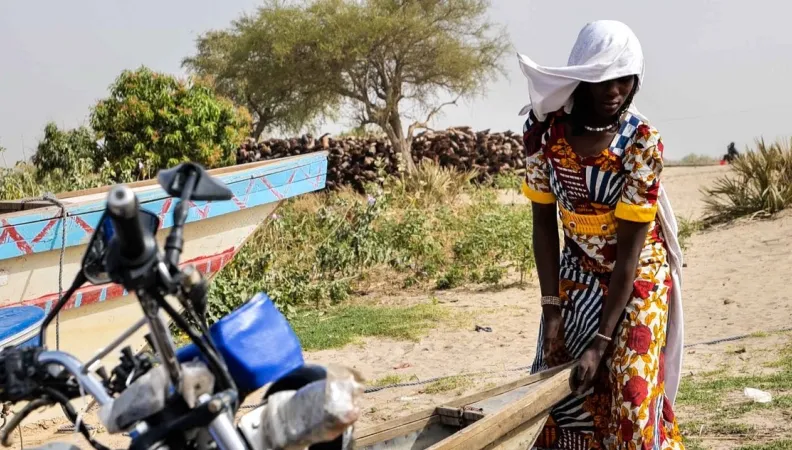Share the page
From research to action for a fairer green transition
Published on

In South Africa, Mexico, Colombia and Indonesia, researchers are doing more than studying inequality. They are working with governments to identify ways of making the ecological transition an opportunity to build fairer societies. This work, supported by the European Union and Agence Française de Développement (AFD), will continue for another three years.
In the face of the climate crisis, all countries face a common challenge: to turn the ecological (or “green”) transition into a driver for rethinking economic models in depth, without leaving anyone behind. The stakes are high. According to the OECD, ecological transitions risk exacerbating economic, social and territorial inequalities. Therefore, for a transition that is fair for all, it is essential to implement public policies that are compatible with ecological imperatives, do not disproportionately burden the most vulnerable groups, and deliver widely shared benefits.
This was precisely the objective of the second phase of the EU-AFD Research Facility on Inequalities. The research projects it funded and supported have resulted in detailed analyses and concrete recommendations to support partner countries.
“[This research program] has been our shared laboratory on reducing inequalities. It’s a space where evidence meets policy, where researchers and practitioners work together to address one of the challenges of our time: inequality,” explains Koen Doens, Director-General for International Partnerships at the European Commission.
“We have a lot of solid evidence, and this Research Facility has generated a great deal of it, not only in theory but in practice,” adds Saul Musker, Director of Strategy and Delivery Support in the Private Office of the President of the Republic of South Africa. For instance, in South Africa, which is transitioning away from coal, a study led by the University of Cape Town under the Facility mapped the profile of workers at risk of losing their jobs, 80% of whom are located in a single region, Mpumalanga. The research team then proposed a package of social protection measures tailored to workers' age and skills (temporary financial support, training, early retirement…), which could be implemented through existing mechanisms.
Practical policy recommendations
In South Africa, the data and analyses resulting from research have led to recommendations that inform public decision-making processes, particularly those related to the Just Energy Transition (JET).
A similar approach is being taken in Indonesia, where the Facility modeled various scenarios for redistributing the revenues from a carbon tax, with impacts varying by income level and region. The study, conducted by the LPEM research institute, proposes financial support for households facing energy poverty, making the tax more equitable.
A final example comes from Mexico, where the Facility proposed replacing non-means-tested electricity consumption subsidies with a more strategic investment: installing rooftop solar panels on low-income homes. The study, carried out by the Tecnológico de Monterrey, shows that in just five years, this could generate capacity equivalent to that of a new power plant, save public funds and accelerate the energy transition. The same budget envelope would thus be redirected from consumption subsidies, which disproportionately benefit middle- and upper-income households, to inclusive infrastructure investments that also benefit the less well-off.
“The lesson is simple: rigorous research, produced collectively and shared clearly, can shift debates and support fairer strategies,” says Thomas Melonio, Chief Economist and Director of Innovation, Strategy, and Research at AFD.
A starting point
Redistribution through taxation, social protection and vocational training systems are among the key measures explored by the Facility. “I want to commend what has been achieved so far and underline how important this Facility has been. The lessons it brings together inspire us, and Europe’s own experience in tackling inequality is enriched by these innovations,” says Rémy Rioux, AFD’s Chief Executive Officer.
However, these initial outcomes are only a starting point. “We have a vast task ahead when it comes to reconciling environmental and social targets,” stresses Andrea Hurtado, Director General for Climate Action Policy at Mexico’s Secretariat of Environment and Natural Resources. “Building transitions is not easy. It means making tough choices and compromises,” adds Rudi Dicks, Head of the Project Management Office in the South African Presidency. Financing such policies, whether through national resources or international funding, remains a major challenge.
The European Union and AFD will continue to be engaged in the fight against economic, social and environmental inequalities, a key focus of the EU’s Global Gateway strategy. With new funding of €1.5 million for 2026–2028, the Research Facility on Inequalities will support these efforts by reinforcing the social dimension of this strategy and the adoption of the I-Marker, an “inequality marker” designed to measure whether an investment contributes to reducing inequalities.
